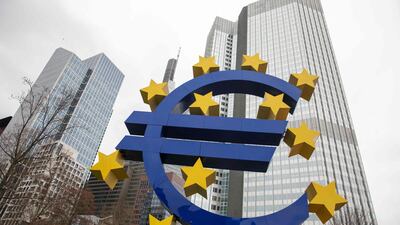Live updates: follow the latest news on Russia-Ukraine
The euro fell to a seven-year low versus the Swiss franc and hit its lowest point in almost two years versus the dollar on Friday as the war in Ukraine lowered expectations for European economic growth.
The European single currency has fallen 2.1 per cent this week and is set for its worst week since April 2020.
It was down 0.5 per cent to $1.10 at 12.50pm UAE time, near its weakest level since May 2020, following news that Russian forces had captured the largest nuclear power plant in Europe after a building at the complex was set ablaze during fighting with Ukrainian defenders.
Authorities later said the fire in a building identified as a training centre had been extinguished. US Energy Secretary Jennifer Granholm said there was no indication of elevated radiation levels at the plant.
Versus sterling, the euro hit its weakest level of 82.61 pence since July 2016, and touched its lowest level since January 2015 of 1.0114 against the “safe-haven” Swiss Franc.
Analysts said the effects of surging energy and gas prices will likely undermine European consumption and economic growth prospects.
“The ECB is going to have no alternative but to look through this surge in inflation but the Fed is not going to delay so we will see more monetary divergence again,” said Mike Kelly, Global Head of Asset Allocation & Structured Equities at PineBridge Investments.
“The dollar should be getting a new spring in its step structurally if things do get worse,” he added.
The US dollar index rose 0.36 per cent to 98.073, after touching its highest level since June 2020 against a basket of peers.
While money markets do not expect interest-rate hikes at the European Central Bank's next meeting, the US Federal Reserve is all but certain to raise interest rates at its March 15-16 meeting for the first time since the coronavirus pandemic.
Fed Chairman Jerome Powell repeated his comment that he would back an initial quarter-percentage-point increase in the benchmark rate.
Elsewhere, the Australian dollar continued its advance, helped by the commodities boom, rising 0.6 per cent to a four-month high of $0.7370 versus the US dollar.
High energy prices in turn have prevented the Japanese yen from benefiting as much from the safe-haven flows, as Japan is a net importer of energy.
The yen briefly climbed against the dollar when news of the fire emerged, but later gave up those gains and was little changed at 115.37.



























































